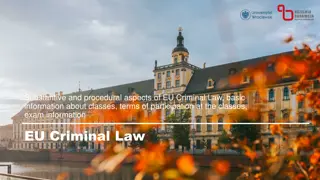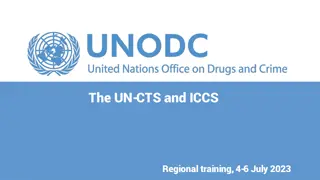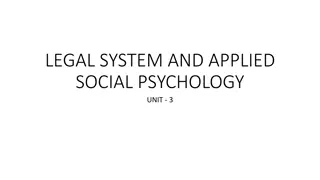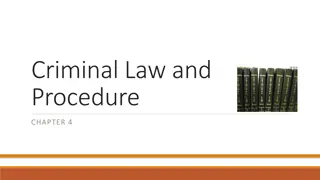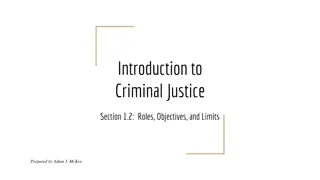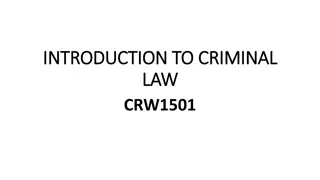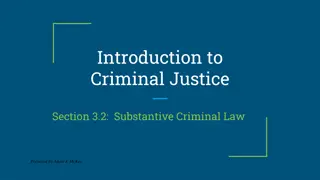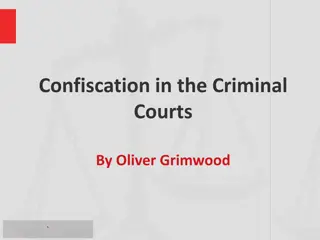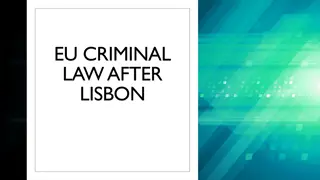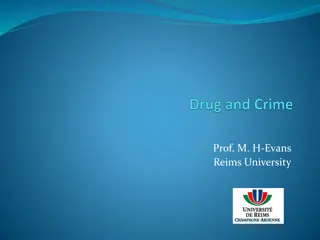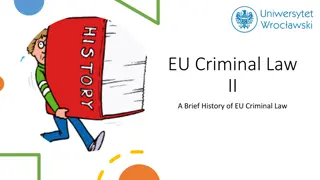Brief History of EU Criminal Law Development
The history of EU criminal law development traces back to the Treaty of Rome in 1957, focusing on the gradual inclusion of human rights and collaboration among Member States in combating terrorism and organized crime. The formation of TREVI groups in the 70s and 80s marked significant milestones in information-sharing and cooperation, reflecting the evolution of EU criminal law in response to changing security challenges.
Download Presentation

Please find below an Image/Link to download the presentation.
The content on the website is provided AS IS for your information and personal use only. It may not be sold, licensed, or shared on other websites without obtaining consent from the author.If you encounter any issues during the download, it is possible that the publisher has removed the file from their server.
You are allowed to download the files provided on this website for personal or commercial use, subject to the condition that they are used lawfully. All files are the property of their respective owners.
The content on the website is provided AS IS for your information and personal use only. It may not be sold, licensed, or shared on other websites without obtaining consent from the author.
E N D
Presentation Transcript
EU Criminal Law II A Brief History of EU Criminal Law
How to analyse history of EU Criminal Law? Will and commitment of Member States are the most important factors for the development of EU criminal law. A policy of small steps - changes are introduced when states are ready to accept them. Limiting the discretion of states in creating substantive and procedural criminal law.
Beginings Treaty of Rome (EEC) - 25 March 1957. Entry into force: 1st January 1958 Initially, the EU was an economic community. Human rights and criminal law were outside the scope of the Community countries. Human rights - competences of the CoE. The ECHR and the case law of the ECtHR and conventions of the CoE on substantive criminal law adopted in the CoE states. Criminal law - competence of member states. "We do not interfere" in what states do on their territory.
Beginings Judgment of the Court of 12 November 1969 Erich Stauder v City of Ulm First ECJ judgment where the Court analysed the problem of fundamental human rights. https://eur-lex.europa.eu/legal- content/EN/TXT/?uri=CELEX%3A61969CJ0029
70s & 80s 1975 - Consultation of the Ministers for Justice and Home Affairs of the Member States on internal security matters, in particular combating terrorism. Creation of the TREVI group - the first stage of cooperation towards common structures in the field of criminal law/cooperation in criminal matters. In the mid-1970s, at the initiative of France, several attempts were also made to create a so-called "European judicial area", mainly aimed at strengthening horizontal cooperation between the judicial authorities of the Member States in criminal
TREVI Group TREVI - Terrorisme, Radicalisme, Extremise et Violence informal groupe created in 70s. The creation of TREVI was prompted by several terrorist acts, most notably the hostage taking and subsequent massacre during the 1972 Olympic Games in Munich, and the inability of Interpol at that time to effectively assist the European countries in combatting terrorism. https://www.youtube.com/watch?v=D3K9VJ6dhNQ&t=32s See also the movie Munch 2005 with Eric Bana, Daniel Craig
TREVI Group TREVI I - gathering and exchanging information on terrorist organisations. TREVI II (1976) - police training and equipment, forensic technology - common state TREVI III ( 1986) - international organised crime, drug crime. TREVI 92 (1989) - impact of free movement of persons on public security; studies the possibility of creating a common information system. The system was created within the framework of Schengen cooperation - SIS TREVI s most important achievement - the introduction of an effective mutual information system between the countries involved and the introduction of a system of liaison officers to enable direct contacts. TREVI cooperation existed until the entry into force of the Maastricht Treaty.
Schengen Convention The Schengen Agreement signed on 15.6.1985 and the Convention implementing this Agreement of 1.6.199017 (both acts entered into force on 26.3.1995). The Agreement was not originally an element of the Community law, but an international agreement concluded between 5 Member States - France, Germany and Benelux countries (Belgium, the Netherlands, Luxembourg), which decided to create a common territory without internal borders The fight against crime within the Schengen area has been facilitated in particular by the possibility of using the SIS information system, the introduction of common rules on cross-border observation and pursuit, and the strengthening of judicial cooperation between states by speeding up the execution of extradition requests and the provision of information on the execution of criminal sentences.
Schengen Convention Article 9 1. The Contracting Parties undertake to adopt a common policy on the movement of persons and, in particular, on the arrangements for visas. They shall assist each other to that end. The Contracting Parties undertake to pursue through common consent the harmonisation of their policies on visas. 2. The visa arrangements relating to third States whose nationals are subject to visa arrangements common to all the Contracting Parties at the time of signing this Convention or at a later date may be amended only by common consent of all the Contracting Parties. A Contracting Party may in exceptional cases derogate from the common visa arrangements relating to a third State where overriding reasons of national policy require an urgent decision. It shall first consult the other Contracting Parties and, in its decision, take account of their interests and the consequences of that decision.
Schengen Convention Article 18 Visas for stays exceeding three months shall be national visas issued by one of the Contracting Parties in accordance with its national law. Such visas shall enable their holders to transit through the territories of the other Contracting Parties in order to reach the territory of the Contracting Party which issued the visa, unless they fail to fulfil the entry conditions referred to in Article 5(1)(a), (d) and (e) or they are on the national list of alerts of the Contracting Party through the territory of which they seek to transit.
Schengen Convention Article 54 (ne bis in idem rule) A person whose trial has been finally disposed of in one Contracting Party may not be prosecuted in another Contracting Party for the same acts provided that, if a penalty has been imposed, it has been enforced, is actually in the process of being enforced or can no longer be enforced under the laws of the sentencing Contracting Party.
Single European Act (SEA) 17 February 1986 and in The Hague (The Netherlands) 28 February 1986. Entry into force: 1st July 1987. Has not made a noticeable contribution to the development of European criminal law. The concept of the internal market has highlighted the need for a common system to combat organised and cross-border crime. BUT human rights were finaly in the Treaty!
Conventions between EC member states Convention between the Member States of the European Communities on Double Jeopardy - 25 May 1987 Agreement on the application between the Member States of the European Comunities of the Council of Europe Convention on the Transfer of Sentenced Persons - 25 May 1987 Agreement between the Member States of the European Comunities on the Tranfer of Proceedings in Criminal Matters - 6 November 1990 Convention between the Member States of the European Comunities on the enforcement of foreign criminal sentences - 13 November 1991
Maatsrich Treaty 1992 Treaty on European Union (TEU) / Maastricht Treaty 7 February 1992. Entry into force: 1st November 1993 Article B The Union shall set itself the following objectives: to develop close cooperation on justice and home affairs TITLE VI. PROVISIONS ON COOPERATION IN THE FIELDS OF JUSTICE AND HOME AFFAIRS (so-called III Pillar) Pillar III was the most complex, legally and organisationally complicated area of European integration
Article K. Cooperation in the fields of justice and home affairs shall be governed by the following provisions Article K.1. For the purposes of achieving the objectives of the Union, in particular the free movement of persons, and without prejudice to the powers of the European Community, Member States shall regard the following areas as matters of common interest: 1. asylum policy; 2. rules governing the crossing by persons of the external borders of the Member States and the exercise of controls thereon; 3. immigration policy and policy regarding nationals of third countries: (a) conditions of entry and movement by nationals of third countries on the territory of Member States; (b) conditions of residence by nationals of third countries on the territory of Member States, including family reunion and access to employment; (c) combatting unauthorized immigration, residence and work by nationals of third countries on the territory of Member States; 4. combatting drug addiction in so far as this is not covered by 7 to 9; 5. combatting fraud on an international scale in so far as this is not covered by 7 to 9; 6. judicial cooperation in civil matters; 7. judicial cooperation in criminal matters; 8. customs cooperation; 9. police cooperation for the purposes of preventing and combatting terrorism, unlawful drug trafficking and other serious forms of international crime, including if necessary certain aspects of customs cooperation, in connection with the organization of a Union-wide system for exchanging information within a European Police Office (Europol).
Maatsrich Treaty 1992 Broad scope of possible cooperation, but weak instruments to implement that cooperation (or to force cooperation) Intergovernmental not supranational character of cooperation Joint positions and joint actions not a very effective measure to build EU Criminal Law (debates over legally binding effect) Conventions long process of ratification
Corpus Iuris The work on Corpus Iuris started after the Maastrich Treaty. First project 1996. Common substantive and procedural criminal law provisions to fight against European crime (catalogue of so-called European crimes). Internationalisation of justice in a new vertical dimension - a proposal to create a European body in the form of a European Public Prosecutor's Office, with jurisdiction extending throughout the EC Project too radical, never entered into force, but proposals from Corpus Iuris are adopted in subsequent EU legislation
Amsterdam Treaty 1997 2nd October 1997. Entry into force: 1 May 1999 New legal instruments : framework decisions and decisions, common positions Increase of the role of Commission and European Parliament (initiative of the Commission and consultation with the Parliament) Increase of the role of Court of Justice Schengen acquis included
Amsterdam Treaty 1997 Article K.1 Without prejudice to the powers of the European Community, the Union's objective shall be to provide citizens with a high level of safety within an area of freedom, security and justice by developing common action among the Member States in the fields of police and judicial cooperation in criminal matters and by preventing and combating racism and xenophobia. That objective shall be achieved by preventing and combating crime, organised or otherwise, in particular terrorism, trafficking in persons and offences against children, illicit drug trafficking and illicit arms trafficking, corruption and fraud, through: - closer cooperation between police forces, customs authorities and other competent authorities in the Member States, both directly and through the European Police Office (Europol), in accordance with the provisions of Articles K.2 and K.4; - closer cooperation between judicial and other competent authorities of the Member States in accordance with the provisions of Articles K.3(a) to (d) and K.4; - approximation, where necessary, of rules on criminal matters in the Member States, in accordance with the provisions of Article K.3(e).
Amsterdam Treaty 1997 Common action on judicial cooperation in criminal matters shall include: (a) facilitating and accelerating cooperation between competent ministries and judicial or equivalent authorities of the Member States in relation to proceedings and the enforcement of decisions; (b) facilitating extradition between Member States; (c) ensuring compatibility in rules applicable in the Member States, as may be necessary to improve such cooperation; (d) preventing conflicts of jurisdiction between Member States; (e) progressively adopting measures establishing minimum rules relating to the constituent elements of criminal acts and to penalties in the fields of organised crime, terrorism and illicit drug trafficking.
Tampere Conclusions 1999 a strategy of milestones - legislative changes designed to lead to closer cooperation in criminal matters and to enhance mutual recognition of judgments The main principles of cooperation: protection of individual rights, approximation of criminal law provisions and coordination of proceedings. https://www.europarl.europa.eu/summits/tam_en.htm#b
Tampere Conclusions - 1999 1. From its very beginning European integration has been firmly rooted in a shared commitment to freedom based on human rights, democratic institutions and the rule of law. These common values have proved necessary for securing peace and developing prosperity in the European Union. They will also serve as a cornerstone for the enlarging Union. 2. The European Union has already put in place for its citizens the major ingredients of a shared area of prosperity and peace: a single market, economic and monetary union, and the capacity to take on global political and economic challenges. The challenge of the Amsterdam Treaty is now to ensure that freedom, which includes the right to move freely throughout the Union, can be enjoyed in conditions of security and justice accessible to all. It is a project which responds to the frequently expressed concerns of citizens and has a direct bearing on their daily lives. 3. This freedom should not, however, be regarded as the exclusive preserve of the Union s own citizens. Its very existence acts as a draw to many others world-wide who cannot enjoy the freedom Union citizens take for granted. It would be in contradiction with Europe s traditions to deny such freedom to those whose circumstances lead them justifiably to seek access to our territory. This in turn requires the Union to develop common policies on asylum and immigration, while taking into account the need for a consistent control of external borders to stop illegal immigration and to combat those who organise it and commit related international crimes. These common policies must be based on principles which are both clear to our own citizens and also offer guarantees to those who seek protection in or access to the European Union.
Tampere Conclusions - 1999 4. The aim is an open and secure European Union, fully committed to the obligations of the Geneva Refugee Convention and other relevant human rights instruments, and able to respond to humanitarian needs on the basis of solidarity. A common approach must also be developed to ensure the integration into our societies of those third country nationals who are lawfully resident in the Union. 5. The enjoyment of freedom requires a genuine area of justice, where people can approach courts and authorities in any Member State as easily as in their own. Criminals must find no ways of exploiting differences in the judicial systems of Member States. Judgements and decisions should be respected and enforced throughout the Union, while safeguarding the basic legal certainty of people and economic operators. Better compatibility and more convergence between the legal systems of Member States must be achieved. 6. People have the right to expect the Union to address the threat to their freedom and legal rights posed by serious crime. To counter these threats a common effort is needed to prevent and fight crime and criminal organisations throughout the Union. The joint mobilisation of police and judicial resources is needed to guarantee that there is no hiding place for criminals or the proceeds of crime within the Union.
Tampere Conclusions - 1999 7. The area of freedom, security and justice should be based on the principles of transparency and democratic control. We must develop an open dialogue with civil society on the aims and principles of this area in order to strengthen citizens acceptance and support. In order to maintain confidence in authorities, common standards on the integrity of authorities should be developed. 8. The European Council considers it essential that in these areas the Union should also develop a capacity to act and be regarded as a significant partner on the international scene. This requires close co-operation with partner countries and international organisations, in particular the Council of Europe, OSCE, OECD and the United Nations. 9. The European Council invites the Council and the Commission, in close co- operation with the European Parliament, to promote the full and immediate implementation of the Treaty of Amsterdam on the basis of the Vienna Action Plan and of the following political guidelines and concrete objectives agreed here in Tampere.
Nice Treaty Signed in: Nice (France) 26 February 2001. Entry into force: 1 February 2003 The Treaty of Nice did not bring as many important changes as the Amsterdam Treaty. Its most important provisions were the introduction of a basis for the creation of a European Judicial Cooperation Unit (Eurojust) and the extension of the jurisdiction of the ECJ. However, the proposal to establish a European Public Prosecutor's Office was not accepted.
11.09.2001 and its consequences The rapid adoption of the EAW framework decision, which had previously seemed unlikely. The encouraged the EU bodies to take further initiatives. success of this instrument Legislative work was also catalysed by the terrorist attacks in Madrid (2004) and London (2005). States recognise the need for close cooperation in criminal matters and effective prosecution of crimes.
Hague programme HE HAGUE PROGRAMME: STRENGTHENING FREEDOM, SECURITY AND JUSTICE IN THE EUROPEAN UNION (2005/C 53/01) https://eur-lex.europa.eu/legal- content/EN/TXT/HTML/?uri=CELEX:52005XG0303(01)&from=PL
Criminal law competences of EC? General power to approximate laws (Article 95, 308 Treaty EC) for the purpose of functioning of common market Article 175 Treaty EC in the scope of enviromental protection Case C-176/03 judgment of 13 Sept. 2005, Commission v. Council, (Framework Decision on the protection of the environment through criminal law) Case C- 440/05 Judgment of 23 Oct. 2007, Commission v. Council, case (Framework Decision on ship-source pollution)
Case C-176/03 As a general rule, neither criminal law nor the rules of criminal procedure fall within the Community s competence (see, to that effect, Case 203/80 Casati [1981] ECR 2595, paragraph 27, and Case C-226/97Lemmens [1998] ECR I-3711, paragraph 19). However, the last-mentioned finding does not prevent the Community legislature, when the application of effective, proportionate and dissuasive criminal penalties by the competent national authorities is an essential measure for combating serious environmental offences, from taking measures which relate to the criminal law of the Member States which it considers necessary in order to ensure that the rules which it lays down on environmental protection are fully effective. It should also be added that in this instance, although Articles 1 to 7 of the framework decision determine that certain conduct which is particularly detrimental to the environment is to be criminal, they leave to the Member States the choice of the criminal penalties to apply, although, in accordance with Article 5(1) of the decision, the penalties must be effective, proportionate and dissuasive. In those circumstances, the entire framework decision, being indivisible, infringes Article 47 EU as it encroaches on the powers which Article 175 EC confers on the Community. In the light of all the foregoing, the framework decision must be annulled.
Case C-440/05 Although it is true that, as a general rule, neither criminal law nor the rules of criminal procedure fall within the Community s competence, the fact remains that when the application of effective, proportionate and dissuasive criminal penalties by the competent national authorities is an essential measure for combating serious environmental offences, the Community legislature may require the Member States to introduce such penalties in order to ensure that the rules which it lays down in that field are fully effective (see, to that effect, Case C-176/03 Commission v Council, paragraph 48). By contrast, and contrary to the submission of the Commission, the determination of the type and level of the criminal penalties to be applied does not fall within the Community s sphere of competence. In the light of the foregoing, it must be concluded that Framework Decision 2005/667, in encroaching on the competence which Article 80(2) EC attributes to the Community, infringes Article 47 EU and, being indivisible, must be annulled in its entirety.
Next time EU Criminal Law after Treaty of Lisbon


